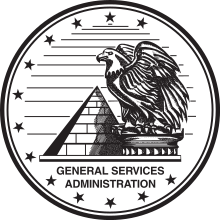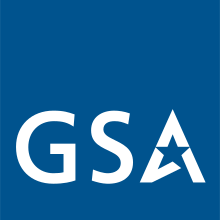Our website is made possible by displaying online advertisements to our visitors.
Please consider supporting us by disabling your ad blocker.
General Services Administration
 Seal of the General Services Administration | |
 Logo of the General Services Administration | |
 Flag of the General Services Administration | |
| Agency overview | |
|---|---|
| Formed | July 1, 1949[1] |
| Headquarters | GSA Building 1800 F Street NW, Washington, D.C., U.S. |
| Employees | 11,137 (FY 2018)[2] |
| Annual budget | $33.6 billion[3] |
| Agency executives |
|
| Child agencies |
|
| Website | www |
The General Services Administration (GSA) is an independent agency of the United States government established in 1949 to help manage and support the basic functioning of federal agencies. GSA supplies products and communications for U.S. government offices, provides transportation and office space to federal employees, and develops government-wide cost-minimizing policies and other management tasks.[6]
GSA employs about 12,000 federal workers. It has an annual operating budget of roughly $33 billion and oversees $66 billion of procurement annually. It contributes to the management of about $500 billion in U.S. federal property, divided chiefly among 8,700 owned and leased buildings and a 215,000 vehicle motor pool. Among the real estate assets it manages are the Ronald Reagan Building and International Trade Center in Washington, D.C., which is the largest U.S. federal building after the Pentagon.
GSA's business lines include the Federal Acquisition Service (FAS) and the Public Buildings Service (PBS), as well as several Staff Offices including the Office of Government-wide Policy, the Office of Small Business Utilization, and the Office of Mission Assurance. As part of FAS, GSA's Technology Transformation Services (TTS) helps federal agencies improve the delivery of information and services to the public.[7] Key initiatives include the Presidential Innovation Fellows program, 18F (includes login.gov and cloud.gov), FedRAMP, the USAGov platform (USA.gov, GobiernoUSA.gov), Data.gov, and Challenge.gov, the U.S. Web Design System, and I.T. Modernization Centers of Excellence.
GSA is a member of the Procurement G6, an informal group leading the use of framework agreements and e-procurement instruments in public procurement.
- ^ "A Brief History of the GSA". GSA. Archived from the original on October 10, 2019. Retrieved October 16, 2019.
- ^ "GSA 2018 Financial Report". GSA. Archived from the original on October 16, 2019. Retrieved October 16, 2019.
- ^ "GSA FY2018 Consolidated Financial Statements" (PDF). GSA. Archived (PDF) from the original on October 16, 2019. Retrieved October 16, 2019.
- ^ "GSA Organization". U.S. General Services Administration. January 24, 2017. Archived from the original on April 14, 2017. Retrieved April 13, 2017.
- ^ "GSA Deputy Administrator". GSA. Retrieved July 15, 2021.
- ^ "Mission and Priorities". U.S. General Services Administration. January 15, 2013. Archived from the original on February 18, 2013. Retrieved February 8, 2013.
- ^ "Office of Products and Programs". U.S. General Services Administration. March 16, 2017. Archived from the original on April 14, 2017. Retrieved April 13, 2017.
Previous Page Next Page
إدارة الخدمات العامة الأمريكية Arabic General Services Administration German Administración de Servicios Generales Spanish Administration des services généraux French מינהל השירותים הכלליים HE General Services Administration Italian General Services Administration NB Управление общих служб (США) Russian General Services Administration SIMPLE General Services Administration Swedish


